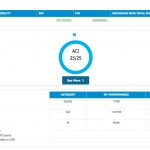“By just focusing on pneumococcal vaccination, this work helped prime our team to think about all vaccines within the context of the improvement workflow we established,” Dr. Desai notes. “In addition, when the CDC guidelines for pneumococcal vaccination were changed a few years ago, our rheumatology practices were able to more easily adapt these recommendations into clinical practice.”
She does caution that considerations for how to implement a QI project do differ between a small private practice and a medical group in a large academic setting. However, she says one common denominator for finding success with QI is establishing “quick wins” with mini quality projects.
Here are five mini quality projects that Dr. Desai suggests can help jumpstart the QI process for a rheumatology practice:
- Track uric acid levels for patients with gout.
Project goal: Improve early identification of patients with gout, and monitor to reduce incidence of gout attacks.
Data to measure: Identify and follow all patients with gout through billing codes, medication lists and uric acid lab tests. - Measure bone density and osteoporosis treatment in women older than age 65 who are seen in rheumatology practices.
Project goal: Identify female patients who are at high risk for osteoporosis to reduce their risk of fracture.
Data to measure: Track the incidence of bone-density tests and use of appropriate osteoporosis medications, incidence of osteoporotic fractures and associated risk factors, such as long-term steroid use and patients with rheumatoid arthritis. - Measure immunosuppressed patient vaccination rates.
Project goal: Improve the rate of up-to-date vaccinations for all patients prescribed immunosuppressive rheumatology medications.
Data to measure: Patient vaccination history, discussion with clinician regarding education related to the need for vaccinations and immuonosuppressive medications. - Monitor regular lab testing for patients on specific medications.
Project goal: Improve standardized monitoring of lab testing for patients on such medications as immunosuppressants.
Data to measure: Patients according to immunosuppressant medications and associated regular blood tests for these patients. Caveat: Different lab testing is required for different medications. - Monitor a checklist of interventions for patients on immunosuppressants.
Project goal: Improve standardized confirmation and completion of specific checklist items required for patients on immunosuppressants, including regular lab testing (baseline and hepatitis related), tuberculosis screening/testing, discussion of the risks and benefits of medication and vaccinations.
Data to measure: Patients prescribed immunosuppressants with cross-reference for patient status with up-to-date vaccinations, labs and documentation of risk/benefit discussion.
Managing Quality Data
An additional challenge to receiving credit for QI under MIPS is being able to report demonstrated improvement data. One tool rheumatologists are using to meet MIPS data requirement is the ACR’s RISE (Rheumatology Informatics System for Effectiveness) Registry, according to Salahuddin Kazi, MD, vice chair of education and director of residency training in the Department of Internal Medicine’s Division of Rheumatic Diseases at the University of Texas Southwestern Medical Center in Dallas.


